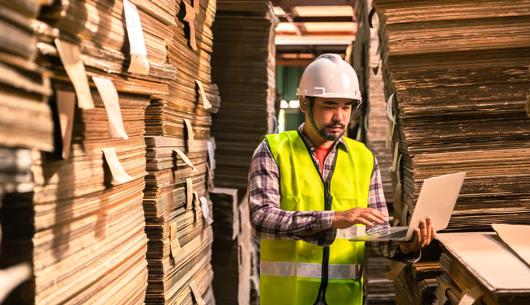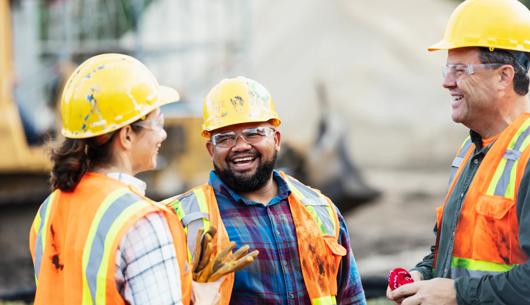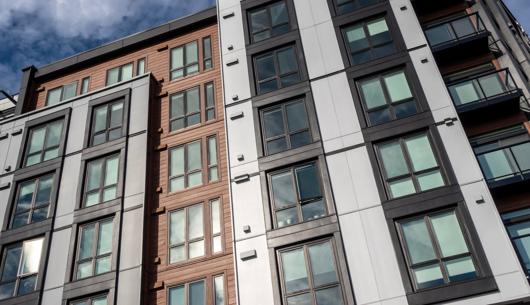Safe use of council offices
The Government’s Covid-19: Guidance for the Safe Use of Council Buildings (Safe Use Guidance) in relation to the safe use of local authority buildings during the Covid-19 pandemic, has been updated at the end of March 2021 in line with progression of the Government’s Roadmap.
This article is taken from April's public matters newsletter. Click here to view more articles from this issue.
The Government’s Covid-19: Guidance for the Safe Use of Council Buildings (Safe Use Guidance) in relation to the safe use of local authority buildings during the Covid-19 pandemic, has been updated at the end of March 2021 in line with progression of the Government’s Roadmap. This Safe Use Guidance can be found here and should be treated only as a guide with relevant legislation, Covid-19 rules and further guidance, being read in conjunction with this.
Reopening Local Authority Buildings Safely
Local authority buildings are able to open under the Government’s Roadmap, provided they take appropriate steps to ensure the safety of those attending before and during their visit, and that all those attending are kept up to date with and are aware of all safety measures in place. The Safe Use Guidance is provided to assist those who are responsible for the management of buildings (Operators) and applies to anyone in attendance at a local authority building including visitors and councillors. Operators of a local authority building must ensure they carry out a Covid-19 risk assessment in order to decide how to conduct activity safely when reopening, and must follow all public health guidance, safe workplace guidelines, social distancing and any local restrictions or lockdown imposed. The Covid-19 risk assessment carried out should be in addition to any previous risk assessments carried out, and Operators are encouraged to use the Health and Safety Executive’s (HSE) risk assessment template. The local authority should apply the Safe Use Guidance depending on their circumstances, for example, the size of the local authority, type of activities carried out there, how it is organised, operated, managed and regulated. Social distancing of 2m or 1m with risk mitigation (where 2m is not a viable option), for example increased frequency of hand washing and surface cleaning and using screens or barriers to separate people from each other, should be adhered to with face coverings being worn unless the individual is exempt due to a health condition, their age or other condition.
Should any individual test positive for coronavirus or come into contact with someone who has tested positive, then the NHS Test and Trace Guidance must be followed. It is essential that records are kept by the Operator of all staff working on site, including their shift times and contact details, and the details of any attendance by visitors as well as their contact details. For anyone attending, they must have access to an official NHS QR code which should be displayed in the building so they can ‘check in’, as an alternative option to providing contact details. All records should be retained for 21 days, these records may be requested by NHS Test and Trace, and the local authority must adhere with General Data Protection Regulations when holding this data.
Working Safely in Local Authority Buildings
The Government has also provided guidance, Steps to Working Safely (Working Safely Guidance), which details steps for those working in different sectors and services, for example, close contact services, construction and other outdoor work, labs and research facilities, offices and contact centres and other people’s homes. The remainder of this article will focus on the Safe Use Guidance in line with the Working Safely Guidance provided for Offices and Contact Centres.
Working from Home or Office?
If workers are able to work from home, then they must continue to do so. Where workers are unable to do so, they must continue to travel to work, in this case the workers return must be reflected in the Covid-19 risk assessment with actions taken for their return. Any public sector employees who are defined as key workers, including those in the education sector, should continue to go to work. Covid-19 secure guidelines within office spaces must be followed closely to ensure that the risk of submission is reduced.
Anyone who needs to self-isolate, or who is at higher risk, should be particularly considered when carrying out the Covid-19 risk assessment and must be allowed to work from home. This is also the case for any disabled workers or new or expectant mothers. Within the office space, ventilation should be used to reduce the risk of transmission in enclosed spaces.
Reception & Common Areas
The Guidance provides assistance on how to manage customers, visitors and contractors in the local authority building. It is encouraged that unnecessary visits to the office are minimised, and should it be the case that individuals will be visiting the office, that the number of individuals is minimal, and all attending understand the rules they must follow to maintain safety.
Within local authority buildings, the use of office rooms and shared facilities such as canteens and lifts must be considered by Operators to ensure that these areas are Covid-19 secure. There is a legal responsibility on local authorities to protect those attending their buildings, from risk to their health and safety due to workplace hazards such as Covid-19. The main objective of this part of the guidance is to maintain social distancing whilst using these areas.
Should any activities or events be taking place inside of a local authority or community building, then Guidance on the Safe Use of Multi-Purpose Community Facilities must be followed in order to safely reopen and use these areas. The communal nature of these areas means that the risk of transmission is high, particularly due to the varied nature of the activities and services carried out in these places.
Meetings
Due to the coronavirus pandemic and provided for in the Local Authorities and Police and Crime Panels (Coronavirus) (Flexibility of Local Authority and Police and Crime Panel Meetings) (England and Wales) Regulations 2020, local authorities were given an express power to hold public meetings virtually. This provision will no longer apply to meetings on or after 7th May 2021, and local authorities must therefore decide, based on the Covid-19 risk assessment carried out and all guidance in force, whether to use existing powers available to delegate decision making to key individuals (to minimise the number of meetings required to be held) or whether to rely on single-member decision making where their constitution allows. Please refer to the Letter to Council Leaders from MP Luke Hall for further guidance on remote meetings within local authority settings. There is an obligation on local authorities to ensure that the public are able to access the majority of their meetings, it is therefore encouraged that remote access is provided as an option for the public until at least 21 June 2021, in line with the Government’s Roadmap. Local authority meetings taking place physically must comply with the Working Safely Guidance.
Following publication of the letter from MP Luke Hall, a number of local authorities have requested that the High Court allow local authorities to continue to hold meetings remotely past 7th May 2021, some of the reasons for this request are explained by the leading organisations bringing this claim here. A court hearing has been timetabled for 21st April 2021, but as of yet there has been no further comment or guidance provided by the Government in response to this request. The Ministry of Housing, Communities and Local Government confirmed it was recognised that there was ‘a case to be heard’, with the Secretary of State for Housing, Communities and Local Government, Robert Jenrick, revealing that the Government would support the claim. Local authorities should be alert to any updates on this point so that they can be sure of whether they are able to use this express power or not from the 7th May 2021.
Hygiene
Prior to reopening, Operators must ensure that all parts of the local authority building, whether these had been closed or partially used, are cleaned thoroughly. The workplace must be kept clean in order to prevent transmission through the touching of any contaminated surfaces. Throughout the working day all those attending a local authority building must ensure they keep good hygiene, with the local authority using signs and posters to build awareness of good handwashing technique, a need to increase handwashing frequency, promoting avoidance of face touching, and coughing or sneezing into a tissue which is binned safely, or into your arm if a tissue is not available. It is also the case that should there be any merchandise to be dealt with or shared materials (whether kept on site or that which is brought in or out of the site), handwashing facilities must be available or hand sanitiser where handwashing is not practicable, to avoid surface transmission. It is also advisable that any area of a local authority building in use, should be well ventilated to reduce the risk of airborne transmission, through the opening of windows, doors or vents and/or fans or ducts.
Enforcement of Rules
Should it be determined that anyone in attendance at a local authority building is not taking action in order to comply with guidance and public health legislation, for example, if social distancing is not being adhered to, then the HSE or the local authority may take steps to improve the control over the workplace risks of Covid-19. If there is a failure to carry out a Covid-19 risk assessment or the measures taken following the assessment are not suitable, then this would constitute a breach of health and safety legislation and enforcement notices may be issued. If there is a failure to comply, following the issue of enforcement notices, then this would constitute a serious breach, this is a criminal offence, punishable with large fines and possibly up to two years imprisonment.
Points to note
When reopening and operating a local authority building, the following eight priority actions, which are detailed further in the Working Safely Guidance, should be taken in order to protect staff and visitors:
- Complete a Covid-19 risk assessment;
- Clean more often;
- Remind visitors to wear face coverings;
- Make sure everyone is social distancing;
- Provide adequate ventilation;
- Take part in NHS Test and Trace;
- Turn people with Coronavirus symptoms away; and
- Consider the mental health and wellbeing aspects of Covid-19.
These actions will assist in making areas safe during the coronavirus pandemic. We would advise that the Working Safely Guidance and Safe Use Guidance are both read in full in conjunction with other guidance’s which have been issued on more specific points. Should a local authority need further clarification on any points raised in the various pieces of guidance issued, they should contact their sector representative bodies who are working closely with the Government to ensure that all guidance issued is understood correctly and complied with.









































